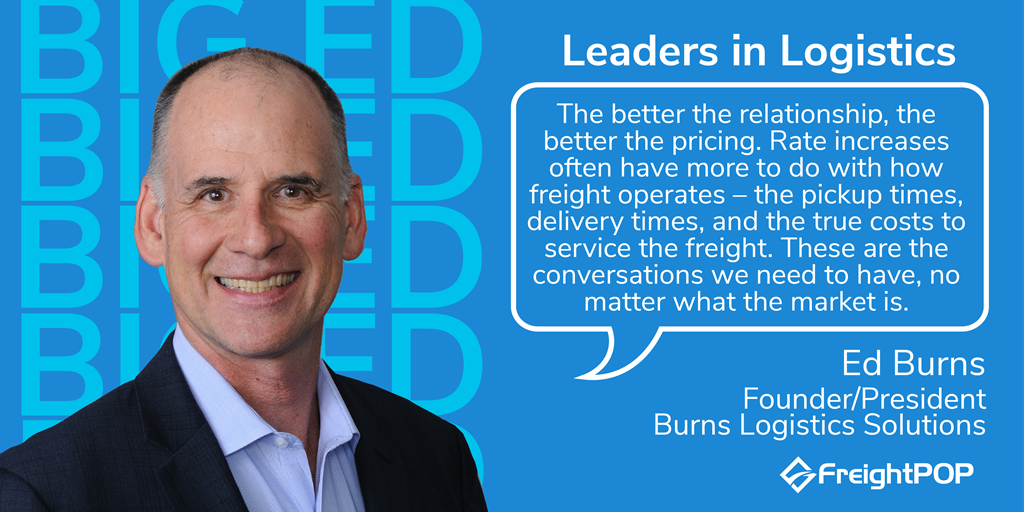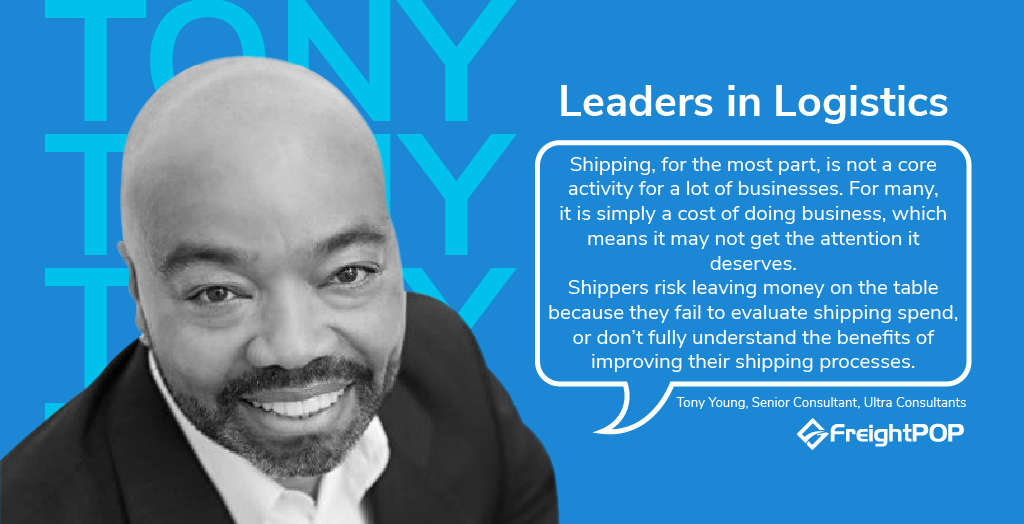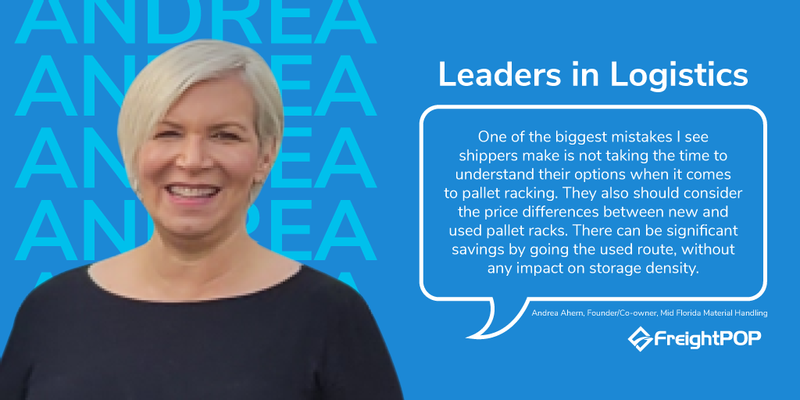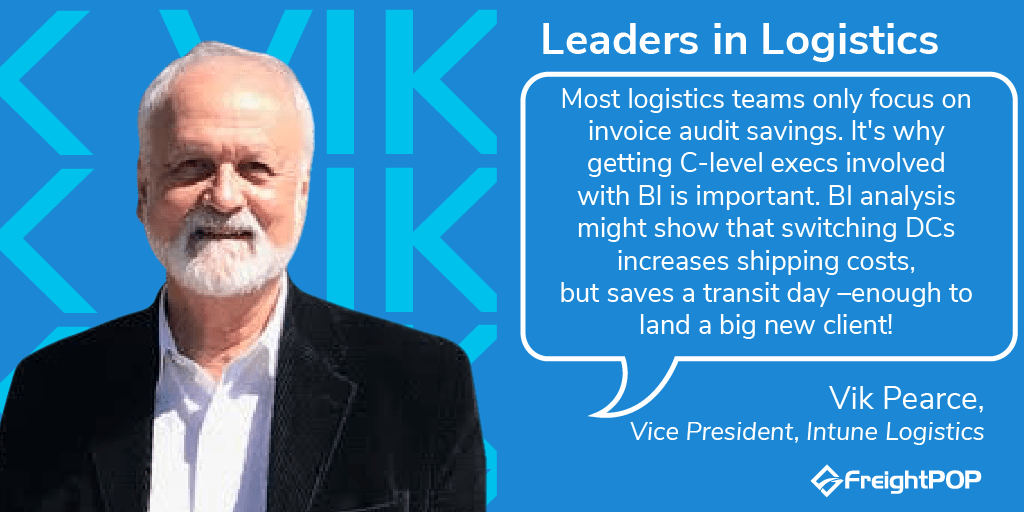Tony Young, ERP Consultant, on the Value of Digitizing Logistics
LEADERS IN LOGISTICS: Tony Young, a senior ERP consultant from Ultra Consultants shares his insight on digitizing logistics, where many shippers...
5 min read
FreightPOP : Dec 6, 2022

LEADERS IN LOGISTICS: Burns Logistics Founder shares insight on freight sales, why building long-term relationships is critical, and how shippers and carriers can work together to secure capacity.
Today we welcome Big Ed Burns, the Founder and President of Burns Logistics Solutions. Ed has been in sales virtually his whole life and has 30 years of logistics and freight transportation experience. He started Burns Logistics when the Great Recession hit in 2008, with a mission to focus on building strong relationships between carriers and shippers, and he has learned a lot along the way.
BIG ED: I come from a sales-oriented background, growing up in New Jersey and later moving to Pennsylvania. I started selling retail shoes when I was young, worked in sales and service for Marriott Hotels, and later sold first aid supplies.
While selling first aid supplies, one of my prospects was a terminal manager for Carolina Freight Carriers. He pretty much gave me a hard no from the get-go, but I kept bugging him, and eventually, he bought my supplies.
Through my continued conversations with that terminal manager, we formed a relationship, and he eventually offered me a sales job. Initially, I turned it down, but my wife became pregnant with our first child, and we needed extra money. So for a time, I sold Band-Aids from 8-5, and then I’d go to Carolina Freight and work the loading docks until midnight or whenever the shift ended.
The manager kept saying, “Ed, you’re such a bad dock worker. We’ve got to get you into sales.” So when he offered me a sales job, I took it. And that was my start in transportation freight sales.
BIG ED: I worked for Carolina Freight, PJAX Freight, JEVIC Transportation, and Pottle’s Transportation, a truckload carrier based in Maine. During the 2008 recession, I lost my job with Pottles’. That’s when I started Burns Logistics.
When I worked for other trucking companies, my customers always asked for additional help – can you do a flatbed? Can you do LTL? Can you do a truckload? Can you go from this point to that point?
But ultimately, when you’re working for a carrier, you know the capabilities of that carrier, and I would always find myself recommending other trucking companies to my customers. Many times, they would follow my recommendations.
At one point I said to my wife, “You know, if I had a nickel for every time I made a recommendation, we would do really, really well.” And that’s now what I do through Burns Logistics – we recommend people. We’re in the relationship business. We have a portfolio of carrier providers that we have relationships with, and we match them up with shippers.
Unfortunately, contentious relationships often exist between shippers and carriers. So we take the volatility out of the supply chain by finding people who will work and play well in the sandbox together over an extended period of time.
BIG ED: We're kind of like the eHarmony of the freight business. We’re a sales company looking to form long-term relationships with our shipper customers and our carrier clients. We’re a very lean operation, but we have a lot of carrier partners and we cast a big net. We’ve made a business out of making recommendations, and we have some very strong partners. We have a reputation for knowing people and connecting them with people who can help them improve their business – we’re a unique consultant.
BIG ED: We’re not a broker. We’re not a third party. We’re a sales company that provides one point of contact for multiple asset-based solutions.
If a carrier needs to hire a salesperson, they need to pay that person as an employee, whether they produce or not. There’s a financial investment upfront. With us, the carriers pay us a small, predetermined percentage of the rates offered. They build our fee into the price, which ends up being a competitive price for the shipper. If we don’t produce anything, there’s no risk to the carrier. At the end of the day, they’re paying for results.
BIG ED: Pricing requests can be very tedious for the carrier, but we provide all the sales and follow-up if the carriers have issues with the customers. From the shippers’ perspective, we are contracted with more than 60 carriers, many of which are niche carriers that many shippers do not know about. We’re not looking for a one-night stand.
We want to build niche relationships. We’re not looking just to move a load today; we want to find somebody who’s moving multiple loads to multiple places and needs carrier partners to help support that business over the long term.
BIG ED: From a shipper perspective, non-asset parties typically price freight lower and offer very aggressive rates. The big guys have tremendous access to capacity, data, and information that is used to predict pricing, and many times it’s easier for them to offer aggressive rates for the shippers they work with. However, when those shippers go to market, they find that the non-asset pricing is significantly less than what the asset-based carriers offer.
I think it’s important for shippers to have a good mix and build their relationships with their carrier base, even though, at times, rates may seem high. I would encourage shippers to take advantage of some of those very low rates but understand that those carriers might not have the chops as soon as things change a bit.
If freight is shipping on a regular basis – every day, a couple of times a week, same origin, same destination – you need a carrier with a truck for that. If something moves once or twice a month, that stuff can be brokered. But if something is shipping every day, that’s where you need a carrier relationship you can count on.
BIG ED: Right now, freight's a little soft, and the spot market is low. Heading into the holiday season, warehouse inventory levels are pretty high, and materials are still coming in from offshore. Some retailers are reducing prices to make room for what’s coming in. With warehouse space tight, there may be early sales.
You can still go to the load board and get cheap prices – everybody needs to pay a fair price. The market fluctuates – sometimes six months, a year, sometimes two years. The relationship between a shipper and a carrier is long-term. No matter how the market fluctuates, it will not be double-digit rate increases for somebody who’s been paying fair rates for a long time. That’s what I try to achieve.
I’m not saying I can make price increases go away for our shippers because I can’t. But if it’s a relationship where somebody has been fair, there might be an increase, but not a double-digit one. The better the relationship, the better the pricing. Rate increases often have more to do with how freight operates – the pickup times, delivery times, and the true costs to service the freight. These are the conversations we need to have, no matter what the market is.
We want to create a win-win relationship for the carriers and the shippers. I encourage people to be creative. There are a lot of different solutions out there. Find a way to ship smarter and be open to what’s available. It isn't complicated. Pick my stuff up when/where I tell you. Deliver it. Don't break it. Charge me what you said you were going to charge me. Basically, that’s logistics and shipping.
Are you a logistics professional with some insight to share? We'd love to hear from you! Reach out to us and schedule an interview!

LEADERS IN LOGISTICS: Tony Young, a senior ERP consultant from Ultra Consultants shares his insight on digitizing logistics, where many shippers...

LEADERS IN LOGISTICS: Check out our tips for warehouse and logistics managers who work with material handling companies. There are some common...

Learn from a freight auditing expert the common pitfalls and opportunities of auditing, how carriers take advantage of shippers, and the benefits of...